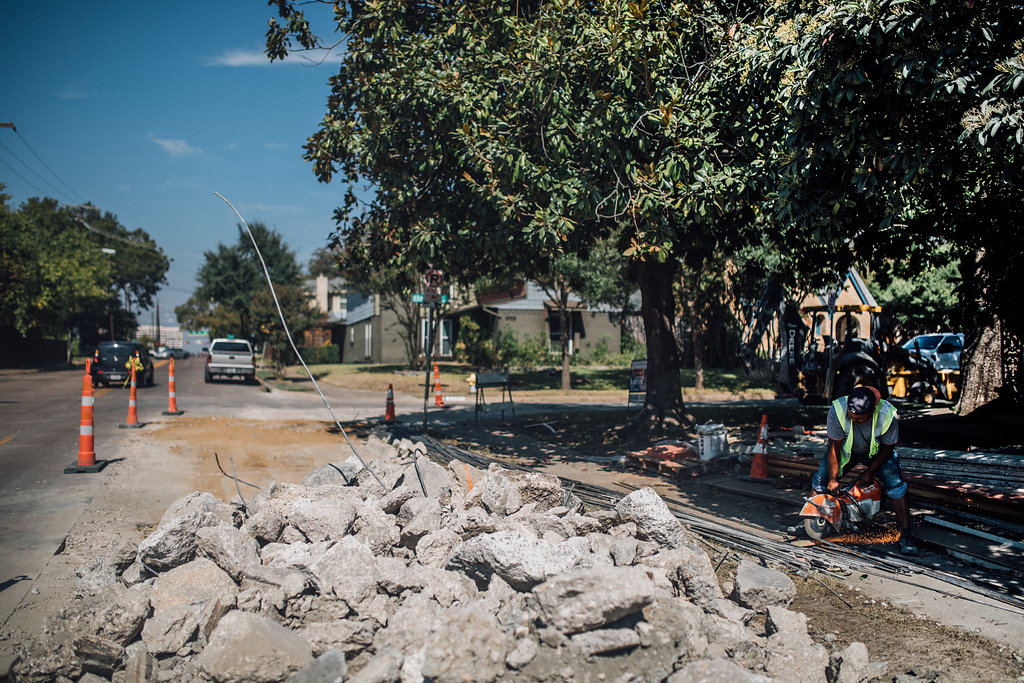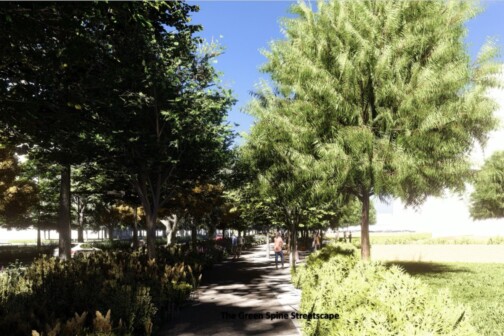The City Council has given itself room to negotiate a higher tax rate than what is being pushed by Mayor Eric Johnson and one of his colleagues. Council this morning voted to set the maximum for next year at the rate recommended by the city manager. It is lower than last year’s and will save median homesteaders about $17 over the course of the year.
The final approved rate could still be below the 73.93 cents per $100 valuation recommended by City Manager T.C. Broadnax, which will result in the city having $13 million less than it did in its previous budget.
Johnson and Councilwoman Cara Mendelsohn, who represents Far North Dallas, have called for a deeper cut to the tax rate that would boost savings for homeowners to an average of about $168 but would mean the city brings in $113 million less than Broadnax’s recommended budget.
There were even props: the mayor held a plastic boat aloft and claimed that the city was headed for an iceberg. Mendelsohn displayed what appeared to be a gift bag with money printed on it that said, “Thanks a million!” on it. She had crossed out the M in favor of a B.
Today’s decision sets the stage for a broader debate later in budget season; the council voted 10-4 in favor of setting the ceiling at 73.93 cents. Later this afternoon, the public will have a chance to comment in front of the City Council about the budget.
Broadnax’s $4.6 billion draft budget for next year is based on a tax rate of 73.93 cents per $100 valuation, a .65-cent reduction from last year’s rate. Even with the $13 million decline in revenue, the city will still collect more than $1 billion in property tax revenue. That accounts for more than half the city’s total revenue. It’s also the eighth consecutive year of a tax rate decrease.
But property values continue to climb in North Texas, which means that even with a lower rate proposed by Broadnax, the city is still projected to raise almost $128 million more in revenue next year. These numbers are based on projections. Dallas Central Appraisal District will still need to appraise homes. Homeowners have the right to DCAD, so values—and revenue—could go up or down.
In a previous budget workshop, city staff said that the average homeowner could save $17 under the recommended rate, but some homeowners, thanks to increasing property values, could see increases. A breakdown within the budget packet declared that a house with an estimated median taxable value of $267,768 and a 20 percent homestead exemption could see an increase of about $65 in its property tax bill.
That rate also includes an increase in the property tax exemption for over-65 homeowners from $115,500 to $139,400. At the pricier end of the scale, someone with a $2 million home could see savings of about $125.
Mendelsohn and Johnson want to see more. Last week, Mendelsohn released an eight-page memo that asks Broadnax to go back to the drawing board and operate off of what she calls a “No New Revenue” tax rate. Mayor Eric Johnson later endorsed the memo. Mendelsohn proposed setting a ceiling of 68.83 cents per $100 valuation.
Broadnax’s recommendation and Mendelsohn’s rate are about 6 cents apart. It would result in more savings for homeowners: about $168 for folks with the median home value of $334,000. But the owner of a $2 million house would save $1,120 compared to Broadnax’s suggested rate.
Mendelsohn’s proposal cites figures from a report by the conservative think tank Texas Public Policy Foundation. She argues that Dallas’ tax levy has increased by almost 57 percent since 2016, while noting that the city’s population has decreased by 1.5 percent.
TPPF is the leader of a push to eradicate property taxes altogether by 2033. Even the Republican controlled Texas Legislature balked at such an extreme move.
Municipalities can do only so much to reduce taxes; property values are soaring all over Dallas. The city has no control over the rate at which a property appreciates. It also can’t necessarily guarantee that there will be zero cuts to city services, because the budget doesn’t factor in any kind of disaster or the cash flow issues surrounding the Dallas Police and Fire Pension System, which will likely need an infusion of money from the city.
During the budget workshop earlier this month, Broadnax explained that they arrived at a tax rate they felt could support the council’s priorities and what residents have said they want. Reducing the tax rate further might lower the property tax bills for residents this year, but it might not be sustainable as the city coffers no longer get federal pandemic dollars (due to end next year), and if other revenue streams slow.
“We put forth the recommendation of what we thought was the appropriate level of services,” said Jack Ireland, the city’s CFO. “It’s a policy decision on what you want to fund.”
And, in a blog post, Mayor Johnson says he doesn’t believe that the city needs to choose between services and lowering the tax rate.
“In this ‘either/or’ world, you have a ‘both/and’ mayor,” he wrote. “You can have a city that taxes you less, spends less, and delivers essential services more efficiently and cost-effectively.”
Mendelsohn points to the fact that Dallas’ tax rate is higher than surrounding cities. There are things Dallas can do to trim the fat. Mendelsohn rightly notes that the city has budgeted for numerous full-time positions that it has little hope of filling, including in the police department. With all the many moving parts at City Hall, there are bound to be inefficiencies that can be addressed, she argues.
But she found pushback around the horseshoe today when she proposed setting the ceiling at the “No New Revenue Rate.” She opened the discussion by chiding her colleagues for campaigning on lowering property taxes, despite the fact that property tax revenue continues to climb thanks to continually increasing property valuations.
Other council members proposed other ceilings—Gay Donnell Willis of Preston Hollow offered up 73.58 cents—but South Dallas’ Adam Bazaldua amended that to what Broadnax originally asked for: 73.93 cents. That’s what the Council decided on.
Willis suggested a penny reduction in Broadnax’s rate because the Council “must signal to our residents that we hear them.” She said she was concerned by the speculation in Mendelsohn’s plan, particularly with regards to the cuts she suggests and the impact the loss of revenue might have on the city’s goals to address deferred maintenance.
“I don’t hear from anyone who wants more deferred maintenance,” she said, pointing to the city’s own survey that found that residents want the city to better maintain its infrastructure, with many respondents saying that is their No. 1 priority, followed by police services. She did agree with Mendelsohn’s assertion that the city likely needed to consider auditing its efficiency, but also said that it would be worth it to “audit our audits” and look at the studies the city has already done.
Bazaldua said he felt that there was no real point in debating the rate today, given that it was merely a ceiling. “We can always go down, and it sounds like there’s an appetite for that,” he said.
Councilwoman Carolyn King Arnold bristled at Mendelson’s suggestion that she lied to her voters, and said she campaigned to represent the interests of her district and ensure that the city’s investments were equitable. The cuts that Mendelsohn proposes, she said, often impact the areas of town that have suffered from disinvestment historically. “This is not the time to set up a rope-a-dope,” Arnold said. “When you cut, we bleed in the southern sector. When you cut, we die in the southern sector.”
Constituents are already hearing from the No New Revenue ground game. Yesterday, voters received text messages from a PAC that registered last year as A Better Dallas, directing the message’s recipients to contact their city council members to encourage them to adopt the lowered tax rate. It is unclear whether the entire city is receiving the text messages or whether the PAC is targeting specific districts. D staffers received texts targeting council members in North Oak Cliff (Chad West), White Rock Lake, (Paula Blackmon), and Preston Hollow (Willis). Here’s a portion:
“Dallas taxpayers have experienced a staggering 64% increase in city taxes since 2016, and staff recommends raising your taxes again! But the vote is up to your city council member,” the text reads. “This is the rate that will NOT increase your taxes but still funds critical priorities. In fact, the No New Revenue rate would result in zero cuts to city services because of the city’s growth. Act today before the council votes tomorrow!”
It then included contact information for the recipient’s council member. That message, of course, is misleading. The tax rate will be reduced no matter what. (Mendelsohn’s own memo says the increase was roughly 57 percent, not 64 percent.)
But residents have an opportunity to learn more with video presentations, or three more town hall meetings that will take place in districts 13, 2, 14, and 5 tomorrow.
Council members have until Friday to submit budget amendments. Those amendments will be discussed on August 30, and the budget will likely be adopted by late September. It will go into effect on October 1.
Author






